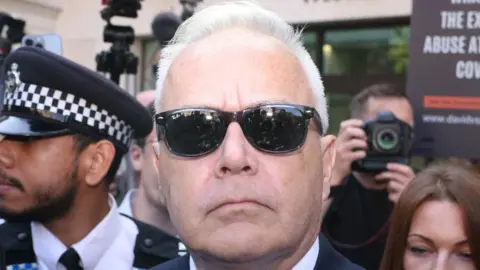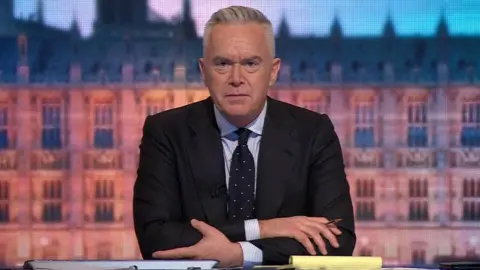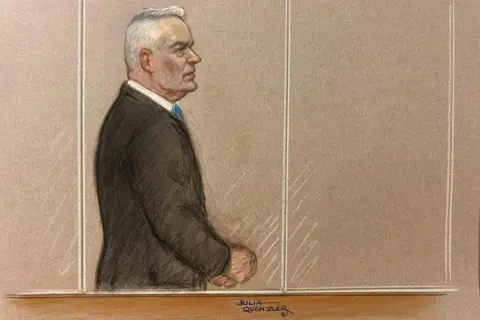 Getty Images
Getty ImagesDisgraced BBC News presenter Huw Edwards is due back in court at a hearing where he could be sentenced for charges involving indecent images of children.
In July, the former newsreader admitted having 41 such images, which were sent to him on WhatsApp – including some showing a victim aged between seven and nine.
He will return to Westminster Magistrates’ Court in London at 10:00 BST on Monday.
He could be sentenced at the hearing, or the case could be referred to a higher court.
The possible punishments include up to three years in jail, or he could receive a community order with a condition that he undergoes a sex offender treatment programme.

Until last year, Edwards was one of the main presenters on BBC One’s News at Ten and often fronted coverage of major national events.
At his last court appearance, he pleaded guilty to three counts of making indecent images of children. Under the law, images can mean photos or video clips.
He was found to have seven category A images – the most serious classification, which show serious abuse including penetrative sexual activity.
Most of the category A images were estimated to show children aged between 13 and 15. Two clips showed a child aged about seven to nine.
He also had 12 category B pictures, which involve non-penetrative sexual activity, and 22 photographs in category C, which covers other indecent images. The category B and C pictures showed children aged between 12 to 15.
Police later revealed the man who sent the images to Edwards was a 25-year-old convicted paedophile called Alex Williams.
 Julia Quenzler
Julia QuenzlerEdwards’ barrister Philip Evans KC told the previous hearing that the former broadcaster had not “in the traditional sense of the word created any image of any sort”.
He added that Edwards “did not keep any images, did not send any to anyone else and did not and has not sought similar images from anywhere else”.
Mr Evans also said the former broadcaster had experienced “both mental and physical” health issues.
The barrister told the court his client “was not just of good character, but of exceptional character”.
At that hearing in July, Ian Hope, prosecuting, told the court that a suspended sentence might be considered for Edwards.
Setting out the potential penalties under the law, he said that where there was the prospect of rehabilitation, a community order and sexual offender treatment programme could be considered as alternatives to a jail sentence.
Edwards was the BBC’s highest-paid journalist, receiving between £475,000-£479,999 between April 2023 and April 2024.
The BBC has asked him to return the £200,000 he earned between his arrest last November and his resignation this April.
The BBC’s director general said last week that “discussions are under way” about the possibility of clawing back the money.
Making indecent images – what does the law say?
“Making” indecent images can have a wide legal definition, and covers more than simply taking or filming the original picture or clip.
The Crown Prosecution Service says it can include:
- opening an email attachment containing an image
- downloading an image from a website to a screen
- storing an image on a computer
- accessing a pornographic website in which an image appears in an automatic “pop-up” window
- receiving an image via social media, even if unsolicited and even if part of a group
- or live-streaming images of children
A court must also decide whether an offence falls into the category of possession, distribution or production.
According to the Sentencing Council, which issues guidelines on sentencing that the courts must follow unless it is in the interests of justice not to do so, creating the original image counts as production – the more serious of the three categories. It adds that “making an image by simple downloading should be treated as possession for the purposes of sentencing”.





